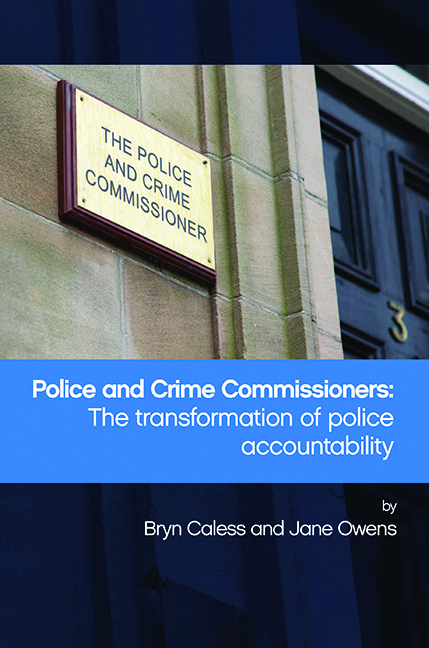Book contents
- Frontmatter
- Dedication
- Contents
- List of tables and figure
- Glossary of terms
- Acknowledgements
- Introduction
- one Governance: the Police and Crime Commissioner and police accountability in context
- two The psephology of the November 2012 election: motive, means and opportunity
- three Is the law on my side? Relationships between the PCC and the chief police officer team
- four Partners, colleagues or rivals for oversight? The (PCC) art of making friends and influencing people
- five “Putting yourself about”: PCCs, the media and the public
- six The debate with no end: PCCs’ remit and the problems of policing
- seven “I wonder if the game is worth the candle”: PCCs, their ‘work–life balance’ and their future
- General summary
- Bibliography
- Appendix Interview questionnaires
- Index
General summary
Published online by Cambridge University Press: 01 September 2022
- Frontmatter
- Dedication
- Contents
- List of tables and figure
- Glossary of terms
- Acknowledgements
- Introduction
- one Governance: the Police and Crime Commissioner and police accountability in context
- two The psephology of the November 2012 election: motive, means and opportunity
- three Is the law on my side? Relationships between the PCC and the chief police officer team
- four Partners, colleagues or rivals for oversight? The (PCC) art of making friends and influencing people
- five “Putting yourself about”: PCCs, the media and the public
- six The debate with no end: PCCs’ remit and the problems of policing
- seven “I wonder if the game is worth the candle”: PCCs, their ‘work–life balance’ and their future
- General summary
- Bibliography
- Appendix Interview questionnaires
- Index
Summary
One of the general questions posed in considering the role of Police and Crime Commissioners is the nature of governance itself, and oversight of the police in particular. The reason for a mechanism which holds the police to account is that the police have proven spectacularly unable to govern themselves (not just in the UK of course, but wherever the police wield force on behalf of the state). There is a defined and time-honoured need for checks and balances to police actions. That the creation of the PCC was a political act does not, of itself, detract from the requirement to oversee the police. Commentators are more or less agreed that establishing the PCC may usher in some politicisation of the police, but we have argued in this book that much of policing is already distinctly politicised, and the advent of stringent budgetary controls and consequent reductions in local staff and resources merely enhances that politicisation. Although much central control has been deputed or ceded to the PCC, there is no devolved autonomy over funding. The Home Office and therefore the government retains some control and some say over police finances. This is not inherently a bad thing, though consciousness of our civil liberties means that we, as citizens, must engage in continuous monitoring to guard against abuses from the centre, just as much as there needs to be alert governance of the police. We must persist in challenging those who ‘guard the guards’ however honourable their intentions.
What is different now from the situation in 2012 is that an ‘elected individual’ has replaced the old police authority and that individual is full time, salaried and can monitor the police on a daily basis, whereas the authority was part time, lay and occasional. The government condemned police authorities as ‘invisible’ and claim that nearly three quarters of the populace now know their PCC. We remain sceptical of such claims and believe that the next rounds of PCC election, in 2016 and 2020, will conclusively show whether the ‘visible PCC’ claim is justified or not. We have examined what the police thought of their authorities and what PCCs think are the changes they themselves have brought to bear, and we have placed that in the context of the governance debate.
- Type
- Chapter
- Information
- Police and Crime CommissionersThe Transformation of Police Accountability, pp. 209 - 216Publisher: Bristol University PressPrint publication year: 2016

